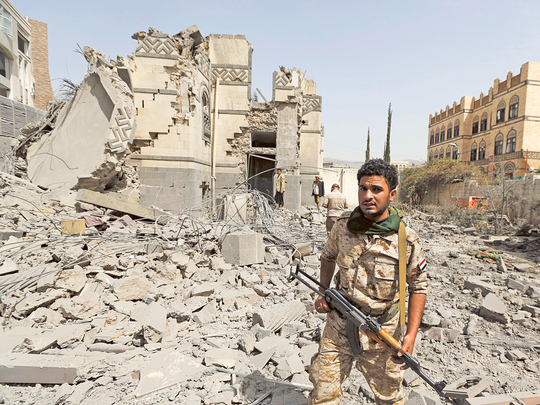
Aden: Crawling under barbed wire and leaping over burning tyres, dozens of bare-chested young fighters train in a barren part of central Yemen, preparing to head to the frontlines of their country’s worsening conflict.
Less than 150 km away in Aden, former army officers are readying a separate contingent of volunteers to join a war that has put the energy-rich Gulf on edge.
Recruited by different factions, both units are set to fight side by side, joining a push by exiled President Abd-Rabbu Mansour Hadi to create a ground force capable of regaining power from dominant Houthi fighters, who are backed by Iran.
The intensive training, recorded on a video posted on Facebook, is recognition that relentless airstrikes coordinated by Hadi’s Saudi allies will not be enough to turn the tide against the Houthis, who have taken over much of Yemen in the past nine months and sent the president fleeing.
“This is the first time I take up weapons and go to battle,” said Abdullah Al Sallal, a 25-year-old unemployed lawyer who has joined a unit that has sworn allegiance to Hadi.
“We are fighting against the injustice and aggression committed by Al Houthis,” he added, while on a visit to his family in Sheikh Othman district north of Aden.
Hadi’s forces are allied to secessionists, like the men training in central Yemen, who call themselves the “Southern Resistance”. Opposition to Al Houthis seems to be the only thing they have in common, with Hadi rejecting any calls for the south of the country to break away from the north.
Yet another potential complication is that Hadi would like his powerful Saudi Arabian allies to establish a safe zone on the coast near Seihut town, some 300 km from the Omani border, where he can base his nascent army, a diplomat said.
But there is no sign that Riyadh backs the safe zone idea as it ponders its next steps following weeks of inconclusive warfare and sees whether UN-sponsored peace talks make progress in Geneva.
Hadi’s fighters nonetheless declare morale is strong.
Though still small in number and with no unified command, the newly-trained fighters have managed to help stop Al Houthi advances on some areas around Aden, and even recaptured the city of Dhalea last month from Al Houthi militants who had seized it.
And this week, Hadi’s force and the Southern Resistance checked an Al Houthi offensive in Aden’s Bir Ahmad district, residents and sources on the battlefront said.
Backed by Saudi funds and logistical support, activists say Hadi loyalists have already put together one brigade comprising between 4,000-5,000 soldiers in Aden, while other loyalists operate in the oil-producing Marib, Hadramout and Shabwa provinces.
“There are military commanders who are ready to participate in rebuilding a national army,” said Mohsen Khasroof, a retired Yemeni army general. “Right now, they may be working as popular resistance, but they will come under one command,” he added, speaking from Egypt where he lives.
In one of his first moves, Hadi despatched his new chief-of-staff, General Mohammad Ali Al Maqdeshi, to rally troops in Hadramout province and promise them better pay and equipment.
“General Al Maqdeshi’s mission was to set up the nucleus of the new Yemeni army starting with the military units loyal to the legitimate government,” a military source said.
Hadi’s generals have since embarked on a recruitment drive, calling on ex-officers of the former South Yemen army who had been laid off by Saleh when his northern forces won a 1994 civil war against the south to do the training.
Recruits receive about $100 a month -- valuable income in a country where jobs are scarce -- and have light weapons provided by air drops from Saudi-led forces. They also have some tanks captured from the Houthis or seized from army depots.
Saudi-led forces say they give Hadis’ supporters logistical support. “But they do not need outside help to train. Yemen has plenty of instructors to do the work,” General Ahmad Al Asseri, spokesman for the Saudi-led alliance, told Reuters.
For its part, the Southern Resistance, stands ‘side by side’ with the Saudi-led alliance, according to Aydarous Al Zubaydi, a former army officer who leads Southern Resistance in Dhalea.
“With southern Yemeni officers being called back ... the question of the possibility that this could play into southern secessionists demands,” said Theodore Karasik, an independent analyst based in the United Arab Emirates. “So there is a question of how much control would Hadi have over these forces.”












